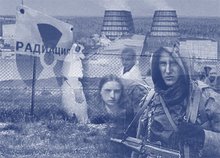The International Core Group on Nuclear Security Culture was established as a follow-up to the October 2005 NATO Advanced Research Workshop "Nuclear Security Culture: From National Best Practices to International Standards." The main objectives of the CG are:
- Support the International Atomic Energy Agency (IAEA) by facilitating and promoting the IAEA’s objectives vis-a-vis nuclear security culture
- Rally international support for the concept of nuclear security culture by working to achieve a common understanding that facilitates comparison, evaluation, improvement, and international cooperation in the field of nuclear security
- Promote a textured concept of nuclear security culture that takes into account varying national traditions, histories, and economic, social, and political realities
Members are being recruited to add geographic balance (e.g., representatives from Japan, Russia, Brazil, and UnitedStates) and multidisciplinary skills (e.g., specialists in industrial psychology and human-resource management). Members will take part in an informal capacity and in keeping with their preferences, limitations, and skills.

Core Group members can choose among several activities at their discretion:
- Remain on our mailing list to receive information regarding security culture
- Furnish advice and comments regarding security-culture-related activity (including through a web-based forum to be included in the WMD Security Culture website)
- Participate in research projects
- Review papers and reports
- Take part in workshops and conferences on behalf of the Core Group
- Provide training at educational and outreach sessions organized by CITS/UGA
- Contribute to the CITS/UGA WMD Security Culture website
Before the IAEA finalizes and approves its concept and definition of nuclear security culture and devises plans for implementation, CITS/UGA will work with the Core Group to:
Exchange information and discuss strategies to promote nuclear security awareness in target countries. In recognition of the key role played by the public in nuclear security, we will conduct public lectures, briefings for the media, training for regional leaders, and other outreach activities as the opportunity presents itself. We will conduct such activities in concert with national authorities or local nongovernmental organizations. We will also craft generic model legal basis conducive to high standards of security awareness and culture.
-
Encourage national legislatures in key countries to approve the July 2005 amendments to the Physical Protection Convention. We will pursue this effort jointly with local nongovernmental organizations and/or private entities. We will hold international workshops and briefings for parliamentarians and their staffs, to be attended by experts from other countries and by IAEA officials. CITS/UGA has compiled an enviable record in this sort of activity, specifically by encouraging national legislatures to enact rigorous export control laws. The contacts and trust we have established to promote export controls will be extremely useful in this endeavor. We will also open new channels of communication through members of the international Core Group. Since security culture is just one of the twelve fundamental principles to be added to the Physical Protection Convention, such events will be instrumental in educating legislators and major stakeholders.
After the IAEA releases its approved package of security-culture documents and guidelines, CITS/UGA, in cooperation with the Core Group, will:
Contribute analysis and articles to a wide range of publications and the CITS WMD Security Culture website, and organize panels on nuclear security culture at relevant national and international conferences. We will use scholarly and applied research to raise the profile of security culture and promote a common understanding of the concept. One immediate objective is to assemble a panel for the 2006 Annual Meeting of the Institute of Nuclear Material Management, scheduled for July 2006 in Nashville, Tennessee. We will report among other things on the findings of our Moscow workshop and on our follow-up activities. Since CITS/UGA is a sustaining member of the INMM and most Core Group members are regular members-the INMM, which co-sponsored the Moscow workshop, awarded free 2006 memberships to all workshop attendees-we intend to organize Core Group activities to coincide with those of the INMM and to coordinate our agendas.
Develop a modular training course consistent with IAEA guidelines that can be tailored to the specific needs and conditions of different regions. The ultimate objective is to develop a cadre of security-culture faculty available to participate in outreach and training projects. Of particular importance will be introducing security culture in countries that are about to embark on the development of nuclear power infrastructure. Nuclear personnel must undergo security-culture training, even before construction of this infrastructure begins.
Develop and test different evaluation methodologies, preferably by conducting pilot projects in selected countries. One project we hope to undertake would focus on the former Soviet republics, which share important similarities resulting from their mutual communist past, common traditions of professional and organizational culture, and other bureaucratic, political, and social characteristics.
Extend the basics of nuclear security culture to radiation sources and to non-nuclear areas such as chemical and biological research and production facilities. The latter effort will require extensive networking with experts in the chemical and biotechnology fields, along with outreach and focused research. We could compile briefing papers examining whether the Organization for the Prohibition of Chemical Weapons (OPCW) and the World Health Organization (WHO) should manage this initiative within their fields of expertise, acting as counterparts to the IAEA. Some Core Group members from the EU countries have recognized the value of applying the principles underlying nuclear security culture to other sensitive areas and have urged us to consider doing this. We agree. We can develop a concept and help decision-makers at the IAEA, the OPCW, and the WHO discern the practical steps necessary to form a security-culture alliance.


1 comment:
Good post.
Post a Comment